
Speaking of Science: Empowering consumers in health and medical research with Professor James St John and hosted by Ms Ainslie Cahill AM
How do researchers effectively involve consumers and the community in their research?
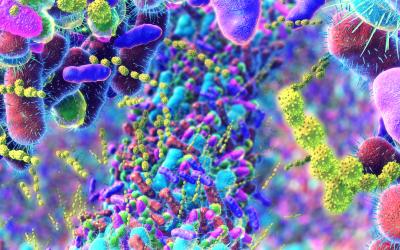
Trust your gut: how the microbiome impacts mental health
Commonly referred to as a ‘second brain’, the role of the gut extends beyond being a digestor of food and drink. In fact, research has demonstrated time and time again the profound partnership between the gut and the brain, and the range of actions elicited by the chemical factory that is our gut microbiome. The gut-brain-axis operates through several pathways and chemical signals that have an influence over our mood, stress levels and cognitive function. So, with the support of the 100 trillion microbes that live within the human digestive system, Australian researchers are discovering how we can improve mental health conditions through diet.

Food for thought: Exploring how diet can improve mental health
As nutritional and psychological sciences advance, the evidence grows that diet is not only vital for physical health but also plays a significant role in mental wellbeing. While the burgeoning field of Nutritional Psychiatry shows correlations between not only what we eat and how we feel and behave, there is still so much to explore.

Speaking of Science: Cultural safety and fostering connections to social and emotional wellbeing with Associate Professor Yvonne Clark
'We work a lot with families, babies, pregnancy and young people, and our goal is to see them flourish or to do research that can move them towards that trajectory of flourishing and not just always surviving.'

Recognising outstanding contributions to Australian health and medical research
Professor Emily Banks AM, recipient of the 2025 NHMRC Outstanding Contribution Award, is a public health physician and epidemiologist working towards improving health and healthcare, at an individual and population level. With interests spanning chronic disease, tobacco control, Aboriginal and Torres Strait Islander Health and healthy ageing, Professor Banks’s extensive research into population health is changing public behaviours, guiding healthcare professionals and having a significant impact in the community.

Decoding the revolution of AI powered healthcare
Signaling the arrival of the digital revolution, artificial intelligence (AI) technologies are increasingly appearing within Australia’s health system. From diagnostics to clinical practice, digitisation of healthcare is promising to enhance delivery by supporting workforce capability, enabling better patient engagement and promoting health literacy and self-management of health conditions. Yet while our appetite for AI and its potential in being a safe, ethical, equitable and effective tool has improved with time, a lot remains unknown.
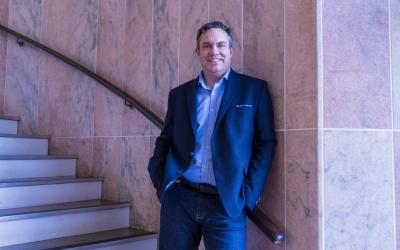
Recognising excellence in developing a world-first Indigenous wellbeing index
Ngiyampaa/Wongaibon social epidemiologist and recipient of the 2023 NHMRC David Cooper Clinical Trials and Cohort Studies Award, Professor Raymond Lovett has focused his career on improving Aboriginal and Torres Strait Islander health. As an Associate Director of Yardhura Walani (Australian National University) and Director of Mayi Kuwayu: The national study of Aboriginal and Torres Strait Islander wellbeing, Professor Lovett’s research has influenced policy at state and national levels, as well as empowered communities at the local level. He is now aiming to take this to the global stage through the development of a world-first Indigenous wellbeing index.
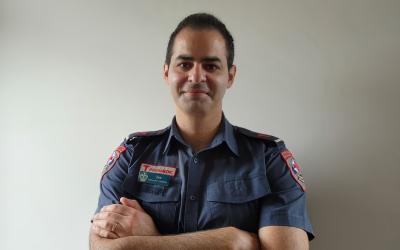
Recognising Excellence in advancing the evidence base in cardiac arrest and resuscitation
Recipient of the 2024 NHMRC Peter Doherty Investigator Grant Award (Emerging Leadership), Dr Ziad Nehme is a paramedic-scientist with expertise in prehospital emergency care and resuscitation research. With a focus on early response to out-of-hospital cardiac arrest patients, Dr Nehme is targeting improvements in early recognition and activation of emergency services, accelerating treatments through community-based care, and enhancing the evidence-base in resuscitation.
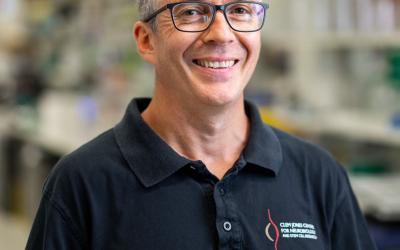
Recognising the power of community engagement in health and medical research
Recipient of the 2025 NHMRC Consumer Involvement Award, Professor James St John is a translational neuroscientist specialising in the creation and delivery of therapies to repair injuries and diseases of the nervous system. He has driven the development of a comprehensive consumer involvement program to design and create a cell transplantation therapy for repairing chronic spinal cord injury which is now progressing to a clinical trial.

Leading through crisis: upholding research integrity in unprecedented times
When Professor Fabienne Mackay stepped into the role of Director and CEO at QIMR Berghofer in late 2020, she expected challenges—navigating a global pandemic, leading a major organisational restructure, and steering a world-class research institute through an evolving funding landscape. What she did not anticipate was facing one of the most significant cases of research misconduct in Australian history.
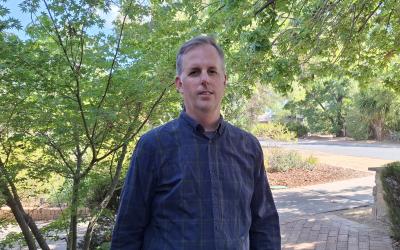
Recognising outstanding contributions to NHMRC’s Principles of Peer Review
Professor Philip Batterham, recipient of the 2025 NHMRC Peer Review Excellence Award (senior/experienced category), exemplifies what it means to be a fair, transparent and enthusiastic peer reviewer. Abiding by our Principles of Peer Review, Professor Batterham has continued to show an unrelenting commitment to providing rigorous assessment of applications for grant funding.
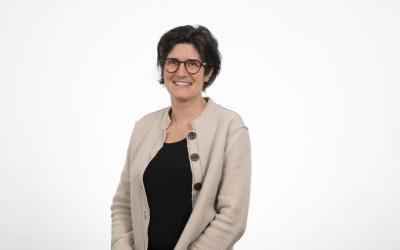
Recognising excellence in identifying and overcoming mechanisms of immune evasion in cancer
Recipient of the 2024 NHMRC Fiona Stanley Synergy Grant Award, Professor Marie-Liesse Asselin-Labat is investigating how cancer evades the immune system and how immunotherapies and cancer vaccines can be enhanced to improve treatment outcomes. Professor Asselin-Labat PharmD, PhD, is a Division Head at WEHI, leading a team that studies the interactions between immune and tumour cells in lung cancer, and how external factors can trigger the disease and treatment response.

Speaking of Science: Interrogating the physiology of the human vagus nerve with Professor Vaughan Macefield
A new era of research that promises to uncover novel information on the physiology of the human vagus nerve is unfolding right before our eyes.
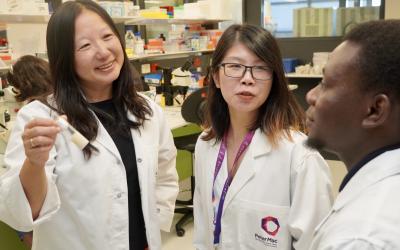
Recognising excellence in cancer cachexia research using fruit flies
Associate Professor Louise Cheng, recipient of the 2024 NHMRC Marshall and Warren Ideas Grant Award, is a group leader at the Peter MacCallum Cancer Centre and the Department of Anatomy and Physiology at the University of Melbourne. Her lab utilises the fruit fly (Drosophila) to study how tumours grow at the expense of other tissues in cancer cachexia- a metabolic syndrome affecting up to 80% of people with advance cancer.
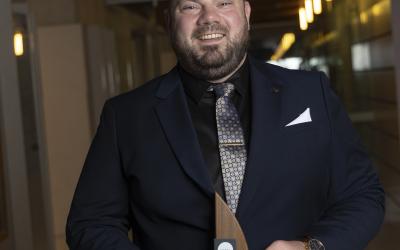
Recognising excellence in turbocharging treatments for type-2 diabetes
Recipient of the 2024 NHMRC Marshall and Warren Innovation Award, Associate Professor Garron Dodd, is globally acknowledged as a top authority in metabolic neuroscience. His research led out of the Metabolic Neuroscience Laboratory at the University of Melbourne has been pivotal in advancing metabolic health both in Australia and internationally, aiming to create innovative therapies for obesity and type-2 diabetes.
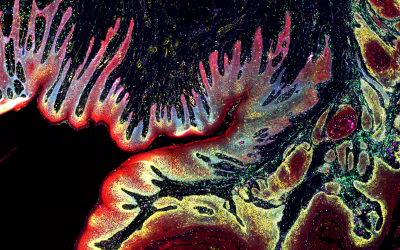
Recognising outstanding scientific imagery beneath the skin’s surface
Associate Professor Arutha Kulasinghe, recipient of the 2025 NHMRC Science to Art Award, is bringing together the rigour of heath and medical research with aesthetically powerful art. With a focus on cutting edge spatial biology and genomic techniques, Associate Professor Kulasinghe is dedicated to unlocking the secrets of individual cell interactions, leading to personalised treatments for several diseases, including cancer.
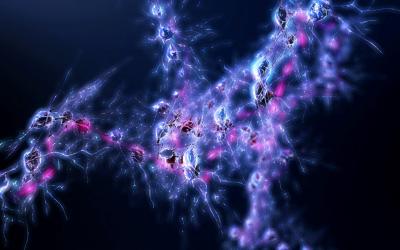
Speaking of Science: Evaluating 23 years of Dementia and Diabetes research
As of 2025, it is estimated that approximately 433,300 Australians are living with dementia, and approximately 1.3 million Australians were living with diabetes in 2022, which equates to roughly 5.3% of the population.
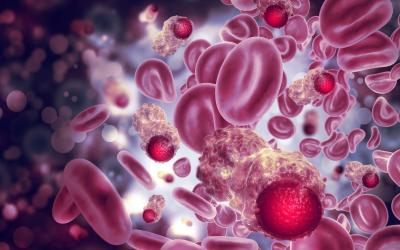
Speaking of Science: Discovering a breakthrough in the fight against cancer with Professor Andrew Wilks
World Cancer Day, observed annually on 4 February, raises awareness about cancer, encourages its prevention, and mobilises action to address the global cancer epidemic.
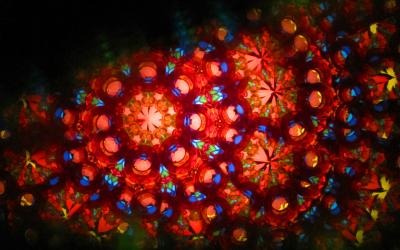
Speaking of science: International Day of Persons with Disabilities
The United Nations (UN) International Day of Persons with Disabilities promotes community awareness, understanding and acceptance of the estimated 1.3 billion people with disability worldwide and to celebrate their achievements.

Speaking of science: Emerging international trends in sex and gender science with Dr Cara Tannenbaum
When it comes to individual health and wellbeing, differences between sex and gender matter and the more consideration that we give to these differences, the more we can improve health outcomes for everyone.

Centering Indigenous research excellence now and into the future
NHMRC is committed to improving the health of Aboriginal and Torres Strait Islander peoples through funding research of the highest quality, integrity and excellence. We also encourage applications across our grant funding program that address Aboriginal and Torres Strait Islander health.

Speaking of Science: Breast Cancer Awareness Month with Professor Belinda Parker
Did you know that breast cancer is the second most common cancer to cause death in women? In Australia, 1 in 7 women will be diagnosed with breast cancer in their lifetime.
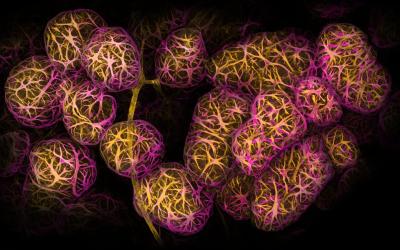
At the intersection of science and art
There’s an area of health and medical research, where scientific discoveries are made and are accompanied by artistic imagery that holds both aesthetic power and major promise for further breakthroughs. This area lies at the intersection of science and art.
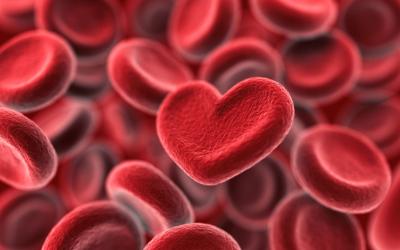
Speaking of Science: SOLVEing Coronary Heart Disease with Professor Julie Redfern
Cardiovascular disease is the world’s number one killer.
On a national scale, coronary heart disease is the leading single cause of disease burden in Australia and causes 11% of all deaths, sparking a real need to make transformative improvements in cardiovascular health management for all Australians.
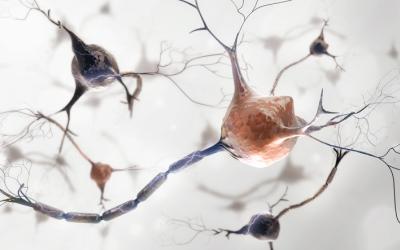
Unified responses to youth substance use and mental disorders
Australia, like many other countries, is facing increasing rates of mental disorders and substance use. Globally, substance use, depression and anxiety disorders are among the leading causes of disease burden in young people. Yet they are treated in isolation, stalling discovery, prevention and treatment.
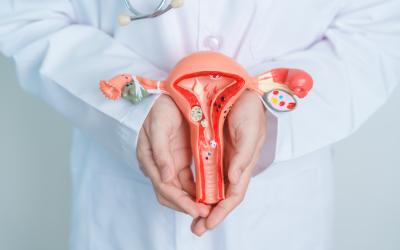
Upskilling gynaecology surgeons for better, less invasive surgical procedures and happier patients
Hysterectomy is the most common major gynaecological procedure Australian women will require in their lifetimes. Yet, up to 2 in 10 patients have developed severe complications following outdated open surgery.

$60 million in funding announced for new Centres of Research Excellence
An investment of $60 million will support researchers to pursue collaborative research that aims to improve health outcomes by translating health and medical research into policy and/or practice funded through the National Health and Medical Research Council’s (NHMRC) Centre of Research Excellence (CRE) scheme.
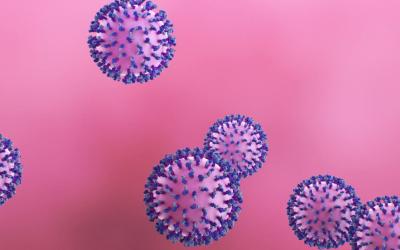
Speaking of Science: Synthetic Biology (designer cells and antibodies) with Professor Shalin Naik
National Science Week is an annual celebration that promotes and encourages interest in STEMM and acknowledges the contributions of Australian scientists to our ever-growing world of knowledge.
In this Speaking of Science webinar held during National Science Week (10 August – 18 August 2024), we were joined by the inspirational cell biologist and Laboratory Head at WEHI and the University of Melbourne, Professor Shalin Naik. Professor Naik is well versed in communicating complex science concepts across to the public in more simple ways where possible, and without belittling the important work that underlies it. In this webinar, he did just that!

Speaking of Science: International Research Translation Practice
Knowledge gained through research underpins improvements in Australia's health and medical services. This research can be fundamental or can be applied, directly addressing clinical problems, public policy, quality of life and environmental health issues or the provision of health services.
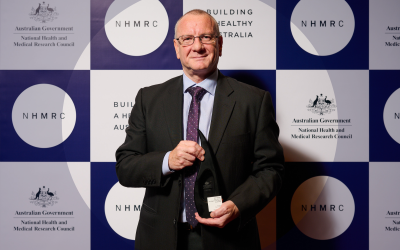
Research Excellence: Structure, function, and modulation of peptide hormone G protein-coupled receptors
Professor Patrick Sexton is the Professor of Pharmacology at the Monash Institute of Pharmaceutical Sciences and is the Director at the ARC Centre for Cryo-electron Microscopy of Membrane Proteins. Professor Sexton is a leader in progressing our understanding of G protein-coupled receptors (GPCRs), particularly allosteric modulation and biased agonism, and applying cryo-EM to study structure and dynamics of GPCRs. He is a Clarivate Analytics highly cited researcher and an elected Fellow of the British Pharmacological Society (BPS). Professor Sexton is also the co-founder of Septerna Inc and DACRA Tx and has been the recipient of many awards for his scientific contributions that have had major impacts on biological chemistry research.
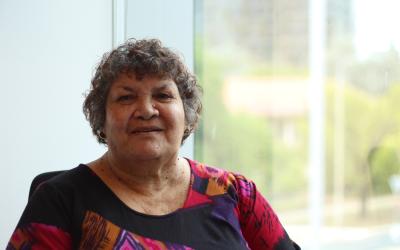
Celebrating a 25-year legacy of Aboriginal and Torres Strait Islander health research with NHMRC
Professor Yvonne Cadet-James, the pioneering researcher, academic, mentor, registered nurse and midwife is celebrating a 25-year legacy of Aboriginal and Torres Strait Islander health research at the National Health and Medical Research Council (NHMRC).
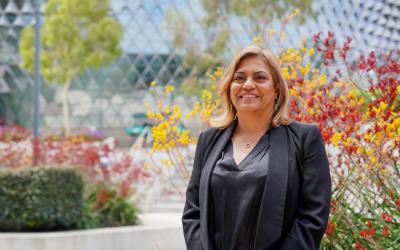
Research Excellence: Advancing health equity of the Aboriginal and Torres Strait Islander population
Associate Professor Odette Pearson is of Eastern Yalanji and Torres Strait Islander descent and coleads the Aboriginal Health Equity Theme, South Australian Health and Medical Research Institute. Her research focus is improving chronic disease and ageing outcomes of Aboriginal and Torres Strait Islander peoples through policy and guideline development and implementing and evaluating real world health and social interventions. Aboriginal leadership, governance and community and cross sector partnerships are foundations of her research. A/Prof Pearson has received the Lowitja Institute Patricia Anderson Leader in Aboriginal Research (2023), UniSA Alumini Award for Research in Aboriginal Health (2022) and The Diane Ranck, SAHMRI award for Leadership in Research (2022).

Speaking of Science: International Men’s Health Week
For the 30th anniversary of International Men’s Health Week (10–16 June 2024), NHMRC shined an important light on key issues impacting the health and wellbeing of Australian men and boys, focusing on the 3 pillars of health: physical, mental and emotional.
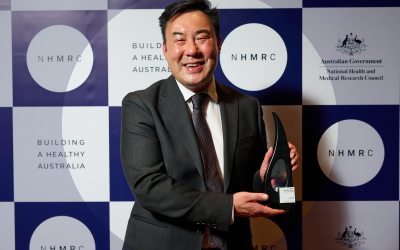
Research Excellence: Developing novel gene expression control mechanisms for ALS gene therapies
Professor Roger Chung is the Professor of Neurobiology and Neurochemistry, and Deputy Dean (Research and Innovation) in the Faculty of Medicine, Health and Human Sciences at Macquarie University. Professor Chung’s research employs a multi-disciplinary approach to understanding the biochemical, molecular and cellular mechanisms that underpin how neurons respond to injury or neurodegenerative disease, and how non-neuronal cells (glia) are involved in modulating this process. Professor Chung is the co-founder and Chief Scientific Officer of CelosiaTX and also leads the Neurochemistry and Molecular Therapeutics Group within the Macquarie University Centre for Motor Neuron Disease Research.
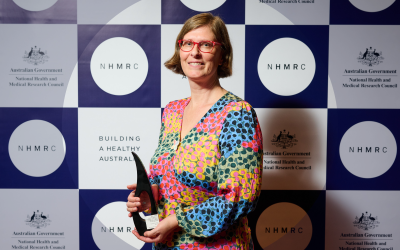
Research Excellence: Driving the transition to high value testing to benefit the health of all
Professor Katy Bell is a clinical epidemiologist and health services researcher at the Sydney School of Public Health. Professor Bell’s research evaluates the clinical effectiveness of healthcare, with a focus on medical tests used for screening, diagnosis and monitoring chronic disease. She is an NHMRC Fellow, and a member of the Medical Services Advisory Committee Evaluation Sub-Committee which critically assesses the evidence supporting applications for new listings on the Medical Benefits Scheme. The quality and impact of Professor Bell’s work has been recognised by awards including a Robinson Fellowship through the University of Sydney (2023) and an Australasian Epidemiological Association Mid-Career Researcher Professional Development Prize (2022).
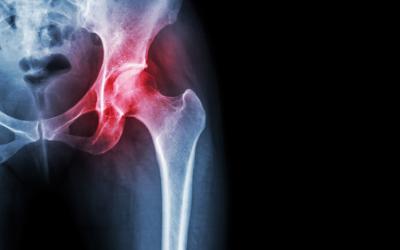
Australian innovators create superior surgical screws for orthopaedic surgeries
Not all orthopaedic implants are created equal. Surgeons repair bone fractures using metal plates and screws but sometimes the screws loosen and the surgery needs to be repeated. Previous expandable screws increased screw fixation strength but were more difficult (or impossible) to remove and increased surgery time.
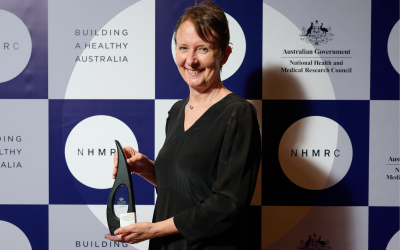
Research Excellence: Strengthening the evidence base for suicide prevention
Professor Jane Pirkis is the Director of the Centre for Mental Health and Community Wellbeing at the University of Melbourne. With a background in public health, Professor Pirkis has worked in the area of suicide prevention for over 25 years, contributing to knowledge about which interventions are effective in preventing suicide. Professor Pirkis’s work has also emphasised media-based interventions and interventions that involve restricting access to means of suicide. Professor Pirkis is the recipient of The University of Melbourne’s Marles Medal (2021) and is also the recipient of a Distinguished Alumni Award at the University of Tasmania (2017) and has received a Lifetime Research LIFE Award through Suicide Prevention Australia (2010).

Speaking of Science: Unlocking the power of Indigenous co-design and intervention: Transformative outcomes through authentic collaboration
National Reconciliation Week is a time for all Australians to learn about our shared histories, cultures, and achievements, and to explore how each of us can join the national efforts towards achieving national reconciliation.
In this Speaking of Science webinar held during National Reconciliation Week (27 May – 3 June 2024), we were joined by distinguished researcher and Indigenous leader, Professor Maree Toombs (Professor of Aboriginal and Torres Strait Islander Health in the University of New South Wales School of Population Health) who walked us through an incredibly moving presentation.
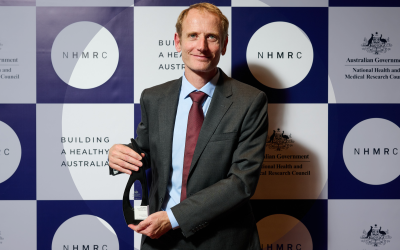
Research Excellence: A new paradigm for how APOE genotype affects brain lipid homeostasis and dementia risk
Professor Anthony Don is Professor of Medical Biochemistry in the School of Medical Sciences at the University of Sydney. His team develops and applies advanced mass spectrometry methods to investigate how alterations to brain lipid metabolism with ageing lead to dementia, develop neuroprotective therapeutics, and discover new biomarkers for demyelinating diseases. His research has uncovered deficits in lipid metabolism that destabilise myelin in the course of normal ageing and early in Alzheimer’s disease pathogenesis. He also developed and coordinates the popular masters-level unit of study, Advances in Disease Diagnosis and Treatment.
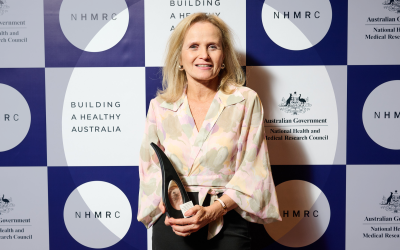
Research Excellence: Novel interventions to treat and cure acute and chronic viral infections
Professor Sharon Lewin is the Director of the Peter Doherty Institute for Infection and Immunity at the University of Melbourne. Her research has focused on strategies to achieve an HIV cure, enhancing clinical outcomes for people living with HIV and hepatitis B and the identification of novel treatments for COVID-19. She is internationally known for her development of laboratory models to study HIV latency and for leading innovative early phase clinical trials aimed at reversing HIV latency. Professor Lewin has received Melburnian of the Year (2014), the Peter Wills Medal from Research Australia (2015), Officer of the Order of Australia (2019), and Medal for Outstanding Female Researcher by the Australian Academy of Health and Medical Sciences (2022).
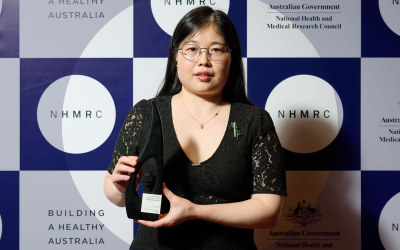
Research Excellence: Pioneering Early Cancer Detection through Nanotechnology
Dr Jiayan Liao is a dedicated researcher specialising in the field of nanotechnology, nanomedicine, biomedical engineering, and their applications in medical diagnostics. Dr Liao’s research focuses on developing innovative diagnostic tools for early cancer detection, leveraging photonics, fluorescent nanoprobes, and artificial intelligence for precise detection of single-molecule biomarkers in diseases and cancers. Dr Liao is contributing to the advancement of diagnostic methodologies and technologies, aiming for non-invasive, early detection methods to improve patient outcomes.
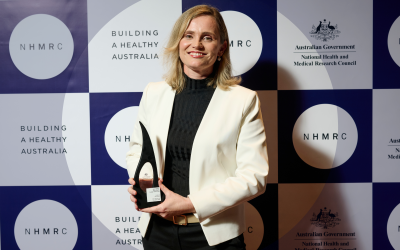
Research Excellence: Solving Australia's Hypertension Treatment Problem
Professor Alta Schutte, SHARP Professor and Principal Theme Lead of Cardiac, Vascular and Metabolic Medicine at the University of New South Wales and The George Institute for Global Health, focuses on implementing effective scalable interventions for global blood pressure control. Appointed Co-Chair of the National Hypertension Taskforce in 2022, she was recognised in 2023 as the Leading Researcher in Vascular Medicine by The Australian. Notably, she received the 2022 Harriet Dustan Award from the American Heart Association and the 2023 Peter Sleight Excellence award from the World Hypertension League. Her impactful work extends to improving cardiovascular health in Australia and beyond.

Speaking of Science: Towards a National Indigenous Genomics Agenda
Harnessing the power of research by combining genomics, precision medicine and public heath can help to address the long-term health and wellbeing of Aboriginal and Torres Strait Islander people.
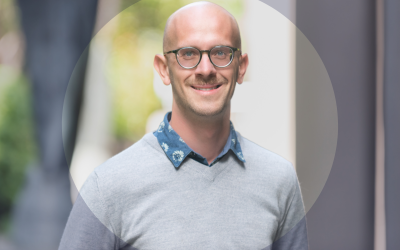
Research Excellence: Designing adaptive strategies to drive tuberculosis towards elimination
Dr Romain Ragonnet is a Senior Research Fellow in the Epidemiological Modelling Unit at Monash University. Dr Ragonnet specialises in the mathematical modelling of tuberculosis (TB) and COVID-19, and his notable contributions include the first-ever quantification of TB mortality and self-recovery rates. Dr Ragonnet has advised various governments of lower-middle-income countries in the Asia-Pacific region to assist the local control of TB and COVID-19. He also initiated and led multiple cross-disciplinary collaborations, creating a strong network of world-leading experts that spans mathematics, medical ethics, biostatistics, economics, and clinical trials.
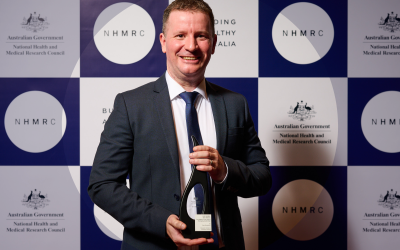
Research Excellence: Unlocking molecular vulnerabilities in childhood brain cancers
Dr Sean Humphrey leads the Functional Phosphoproteomics Laboratory at the Murdoch Children’s Research Institute. Dr Humphrey’s research uses cutting-edge mass spectrometers to create detailed molecular maps that capture how cells communicate and process information by regulating proteins. Dr Humphrey completed his PhD at the University of New South Wales before moving to Germany to undertake post-doctoral training at the Max Planck Institute of Biochemistry in Munich. Dr Humphrey’s research pinpoints key molecular signals that are dysregulated in human disease, uncovering a myriad of new targets for future therapies.
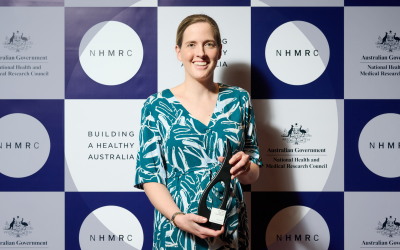
Research Excellence: Epidemiology and equity of kidney failure in Australasia
Dr Johanna Birrell is a general physician and advanced trainee in public health medicine. Dr Birrell has trained in both Australia and New Zealand and has a particular interest in rural health, Indigenous health, and health services research. Dr Birrell is completing her postdoctoral studies at the University of Sydney with concurrent clinical work. Her research explores geographic variation in kidney failure epidemiology and access to care across Australia and New Zealand. Dr Birrell has received awards including the Royal Australasian College of Physicians 2023 Aotearoa Trainee Research Award for Excellence in the Field of Adult Medicine and the Gerry Murphy Prize in 2022.

Speaking of Science: International Women’s Day 2024 - Inspire Inclusion
International Women’s Day represents a day of collective global activism and celebration that belongs to all of those committed to forging women’s equality.
In this Speaking of Science webinar held for International Women’s Day, we were joined by members of NHMRC’s Research Committee to discuss this year’s theme of ‘Inspire Inclusion’.

Speaking of Science: Ovarian Cancer Awareness Month- Early detection, risk prediction and improving prognosis
Around 1,786 new cases of ovarian cancer in Australia were estimated to have been diagnosed in 2023, which is the equivalent of a 1 in 87 lifetime risk.
In our first Speaking of Science webinar, held for Ovarian Cancer Awareness Month, we were joined by international expert in ovarian cancer research, Professor Susan Ramus (Professor of Molecular Oncology in the School of Clinical Medicine at the University of New South Wales).
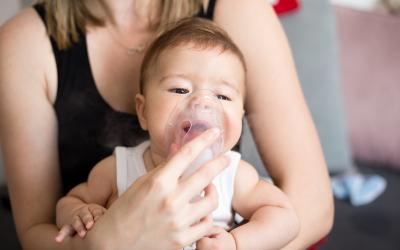
Growing up and getting stronger: improving the long-term health of premature babies
In the early 1970s, Professor Lex Doyle watched as ventilators were introduced in Australian hospitals to help premature babies breathe.

Accelerating change in driver safety screening
While many older Australians value the independence of driving and continue to do so safely throughout their lives, for others, the changes that occur with aging may take them off the road.